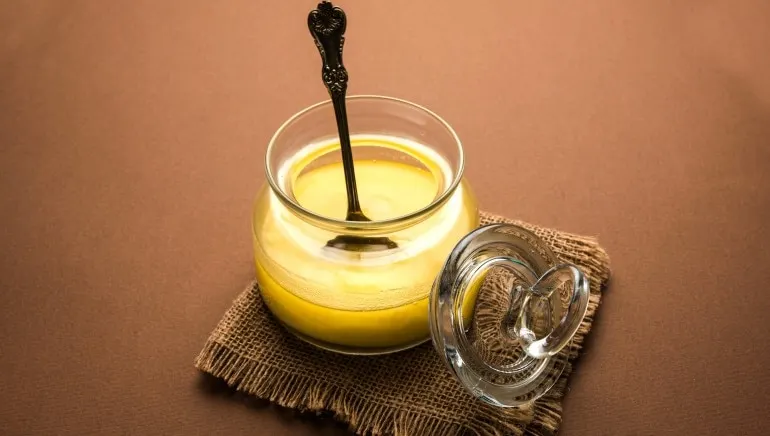Ghee, a clarified form of butter, has been a cornerstone of Ayurvedic medicine and traditional cooking for centuries. It’s rich in nutrients, and its therapeutic properties have been praised in Ayurvedic texts, while modern science is gradually catching up to these ancient claims. This blog post explores the health benefits of ghee from both the ancient wisdom of Ayurveda and the contemporary perspective of modern science.
What is Ghee?
Ghee is made by simmering butter to separate the milk solids from the fat. The process removes most of the lactose and casein, making it a more digestible option for many individuals, including those with dairy sensitivities. In Ayurveda, ghee is often considered a sacred substance, revered for its ability to promote vitality, longevity, and mental clarity.
Ayurveda’s View on Ghee
In Ayurveda, ghee is considered a sattvic food, which means it promotes purity, balance, and harmony in the body and mind. It is believed to nourish the body’s tissues (dhatus), improve digestion, and aid in detoxification. Ghee is also seen as a key component of several Ayurvedic treatments, often used as a medium to deliver herbal compounds deep into tissues.
Here are some key Ayurvedic health benefits of ghee:
- Enhances Digestion: Ghee is believed to stimulate the production of digestive enzymes, making it easier for the body to break down food. It is also said to soothe the digestive system and alleviate constipation.
- Promotes Mental Clarity and Memory: In Ayurveda, ghee is known to improve ojas, which is a vital energy that supports mental and physical strength. It is often used in the treatment of memory-related issues, as it is thought to enhance brain function and concentration.
- Supports Detoxification: Ghee is often included in Ayurvedic detox programs like Panchakarma. It is said to help flush toxins (ama) from the body, support liver function, and purify the digestive tract.
- Balances Vata, Pitta, and Kapha: Ghee’s nourishing properties make it a balancing food for all three doshas in Ayurveda. It is especially recommended for individuals with a predominant Vata constitution, which tends to suffer from dryness and imbalance.
- Promotes Longevity: Ghee is considered an elixir that supports the overall vitality of the body, potentially contributing to a longer and healthier life.
Modern Science Perspective on Ghee
While Ayurveda has long recognized the health benefits of ghee, modern science has also begun to explore the nutritional properties and potential health benefits of this golden fat. Here are some of the scientifically supported benefits of ghee:
- Rich in Healthy Fats: Ghee is a source of butyrate, a short-chain fatty acid that has been shown to have anti-inflammatory properties. Butyrate is important for gut health and is believed to support the integrity of the intestinal wall.
- Good Source of Vitamins: Ghee is rich in fat-soluble vitamins such as Vitamin A, D, E, and K. These vitamins are essential for immune function, bone health, and skin health.
- Supports Heart Health: Contrary to the common misconception that all fats are harmful, ghee contains a combination of healthy monounsaturated and saturated fats that, when consumed in moderation, may support cardiovascular health. Some studies suggest that ghee can help improve cholesterol levels by increasing HDL (good cholesterol) while potentially lowering LDL (bad cholesterol).
- Lactose-Free and Casein-Free: Since ghee is made by clarifying butter and removing milk solids, it is generally considered lactose-free and casein-free, making it a suitable alternative for people with lactose intolerance or milk allergies.
- May Help with Inflammation: The butyrate found in ghee has been linked to anti-inflammatory effects, particularly in the digestive tract. It is believed that butyrate helps maintain gut health by promoting a healthy gut lining and reducing inflammation in the colon.
- High Smoke Point: Ghee has a high smoke point (around 450°F or 232°C), making it an excellent choice for cooking at high temperatures. This means it doesn’t break down into harmful free radicals or produce toxins when used in high-heat cooking, unlike many other oils.
- Improved Nutrient Absorption: Ghee is a good fat that helps the body absorb fat-soluble vitamins and other nutrients more efficiently. This makes it an excellent addition to nutrient-dense meals.
Ghee in the Modern Diet
Ghee is a versatile ingredient that can be incorporated into the modern diet in a variety of ways. It can be used for cooking, baking, and even as a spread. Many people enjoy adding it to their morning coffee or smoothies to increase healthy fat intake, boost energy, and improve mental clarity.
How Much Ghee Should You Consume?
As with any food, moderation is key. While ghee is a nutrient-dense and healthy fat, it is still calorie-dense, so excessive consumption can lead to weight gain or other health concerns. Ayurveda recommends consuming about 1-2 tablespoons of ghee per day, depending on an individual’s constitution and health needs.
Conclusion
Ghee is not just a traditional food or cooking fat but a powerhouse of health benefits. From an Ayurvedic perspective, it nourishes the body, enhances digestion, and promotes mental clarity and longevity. Modern science has also recognized its benefits, particularly its high content of healthy fats, vitamins, and anti-inflammatory properties. When used properly and in moderation, ghee can be a valuable addition to a balanced, health-conscious diet.
So, whether you’re exploring ghee for its Ayurvedic roots or modern-day nutritional benefits, it’s clear that this golden elixir is much more than just a cooking ingredient—it’s a true superfood!



